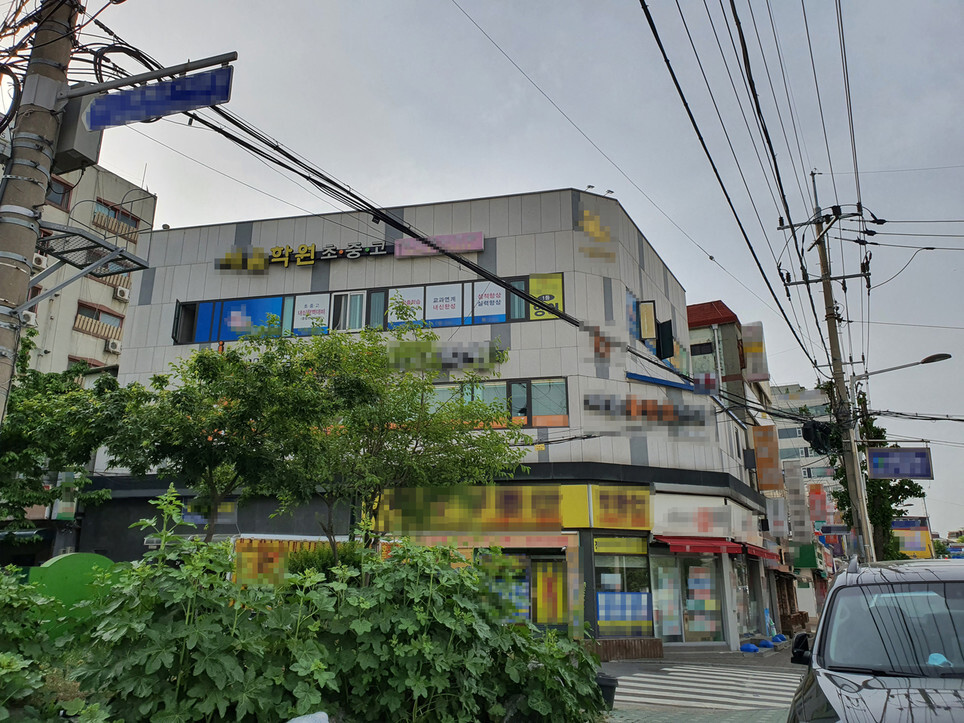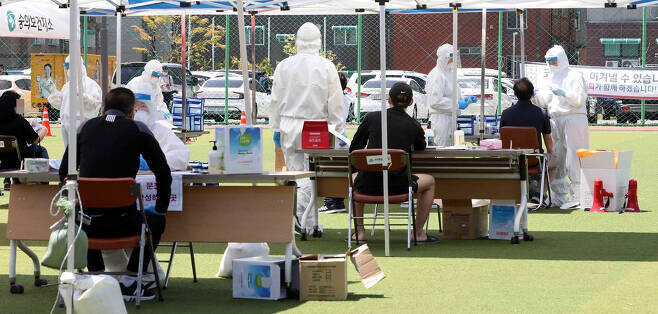hankyoreh
Links to other country sites 다른 나라 사이트 링크
Education authorities to proceed with back-to-school schedule despite Itaewon club outbreak

The coronavirus outbreak that originated at clubs in the Seoul neighborhood of Itaewon has spread to private after-school academies and other areas frequented by Korean students, leading South Korea’s educational authorities to strongly recommend that these academies move their classes online. But the authorities still plan to proceed with their current back-to-school schedule, under which third-year high school students will resume on-campus classes on May 20, with other grades returning in phases thereafter.
Even so, the authorities are planning to resume on-campus classes in various ways aimed at preventing the spread of COVID-19. One approach is called “mirroring,” under which classes will be split up, with half the students watching the lesson on a screen in an adjacent room.
During a briefing on May 14, Vice Education Minister Park Baeg-beom released the results of a survey that asked school staff whether they’d visited Itaewon. The survey found that 34 native ESL teachers and seven local teaching staff had visited Itaewon clubs between Apr. 24 and May 6. Forty of them had tested negative for COVID-19, and one was still waiting for the test. Over the same period, 880 native ESL teachers and local teaching staff had visited Itaewon, with 524 testing negative and 117 still being tested. Eleven native ESL teachers and Korean teaching staff had come into contact with people infected at the Itaewon clubs or the surrounding area.

Amid growing concerns that this transmission cluster will spread further, the educational authorities said they aren’t mulling any further delays of the school schedule. “We’re not considering the option of postponing on-campus classes for third-year high school students. Nor are we reviewing that option for the other grades, though we will keep an eye on the situation. The metropolitan and provincial offices of education are drawing up creative class methods that are suitable for the circumstances in various regions, such as mixing on-campus and online classes,” Park said.
The Ministry of Education (MOE) has said that various approaches are on the table, such as having grades come in for classes on alternating days or weeks, mirroring classes, shortening classes, or mixing in-person and distance classes in what’s called “blended learning.” But the MOE doesn’t plan to give the schools additional guidelines and will leave the details of running in-person classes to the schools and the metropolitan and provincial education offices. The MOE salso said it had discussed various options for school lunches with local education offices, including not providing lunches for morning classes, only giving the students substitute or simple meal options, and maintaining a certain distance between students.
“Students who are getting ready for the university entrance exam might not take time off from their schools or private academies even if they have symptoms. Australia has reduced density by having students come in once a week and holding the rest of classes at home, and Germany has reduced the number of students per class to 10,” said Kim Yoon, a professor of health policy and management at the Seoul National University College of Medicine. Kim argues that Korea’s disease control authorities should first calculate the degree to which classroom density should be reduced and then plan its response based on that calculation.
Deputy Prime Minister and Education Minister Yoo Eun-hae, Seoul Mayor Park Won-soon, and Seoul Metropolitan Office of Education Superintendent Cho Hee-yeon held an emergency meeting on Thursday morning to discuss ways to strengthen disease prevention efforts by more closely monitoring private academies and other public facilities this weekend.
“Swift measures are urgently needed at private academies in particular,” Yoo said, strongly recommending that academies hold classes online and asking students and parents to refrain from using them. These officials also decided to ban gatherings at academies that don’t abide by the disease control guidelines. Even though social distancing guidelines have given way to more routine distancing, these officials plan to assess academies’ disease prevention measures under the earlier standards.
Following reports that some schools have brought students in for practical training and other reasons despite the suspension of in-person classes, the educational authorities announced that they will look into the situation and take appropriate follow-up measures, such as holding audits. On Thursday, the Seoul Metropolitan Office of Education said it had dispatched officials to carry out a surprise inspection of six special-purpose art high schools in its jurisdiction. It was also planning to carry out a special inspection on Thursday of a high school and a middle school, both operated by the same foundation, where students were apparently attending classes during the school shutdown.
By Choi Won-hyung, staff reporter
Please direct comments or questions to [english@hani.co.kr]

Editorial・opinion
![[Column] Season 2 of special prosecutor probe may be coming to Korea soon [Column] Season 2 of special prosecutor probe may be coming to Korea soon](https://flexible.img.hani.co.kr/flexible/normal/500/300/imgdb/original/2024/0426/3317141030699447.jpg) [Column] Season 2 of special prosecutor probe may be coming to Korea soon
[Column] Season 2 of special prosecutor probe may be coming to Korea soon![[Column] Park Geun-hye déjà vu in Yoon Suk-yeol [Column] Park Geun-hye déjà vu in Yoon Suk-yeol](https://flexible.img.hani.co.kr/flexible/normal/500/300/imgdb/original/2024/0424/651713945113788.jpg) [Column] Park Geun-hye déjà vu in Yoon Suk-yeol
[Column] Park Geun-hye déjà vu in Yoon Suk-yeol- [Editorial] New weight of N. Korea’s nuclear threats makes dialogue all the more urgent
- [Guest essay] The real reason Korea’s new right wants to dub Rhee a founding father
- [Column] ‘Choson’: Is it time we start referring to N. Korea in its own terms?
- [Editorial] Japan’s rewriting of history with Korea has gone too far
- [Column] The president’s questionable capacity for dialogue
- [Column] Are chaebol firms just pizza pies for families to divvy up as they please?
- [Column] Has Korea, too, crossed the Rubicon on China?
- [Correspondent’s column] In Japan’s alliance with US, echoes of its past alliances with UK
Most viewed articles
- 1After election rout, Yoon’s left with 3 choices for dealing with the opposition
- 2Two factors that’ll decide if Korea’s economy keeps on its upward trend
- 3Noting shared ‘values,’ Korea hints at passport-free travel with Japan
- 4AI is catching up with humans at a ‘shocking’ rate
- 5Why Kim Jong-un is scrapping the term ‘Day of the Sun’ and toning down fanfare for predecessors
- 6South Korea officially an aged society just 17 years after becoming aging society
- 7Korea’s 1.3% growth in Q1 signals ‘textbook’ return to growth, says government
- 8Value of Korean won down 7.3% in 2024, a steeper plunge than during 2008 crisis
- 9‘We must say no’: Seoul defense chief on Korean, USFK involvement in hypothetical Taiwan crisis
- 10Is Japan about to snatch control of Line messenger from Korea’s Naver?